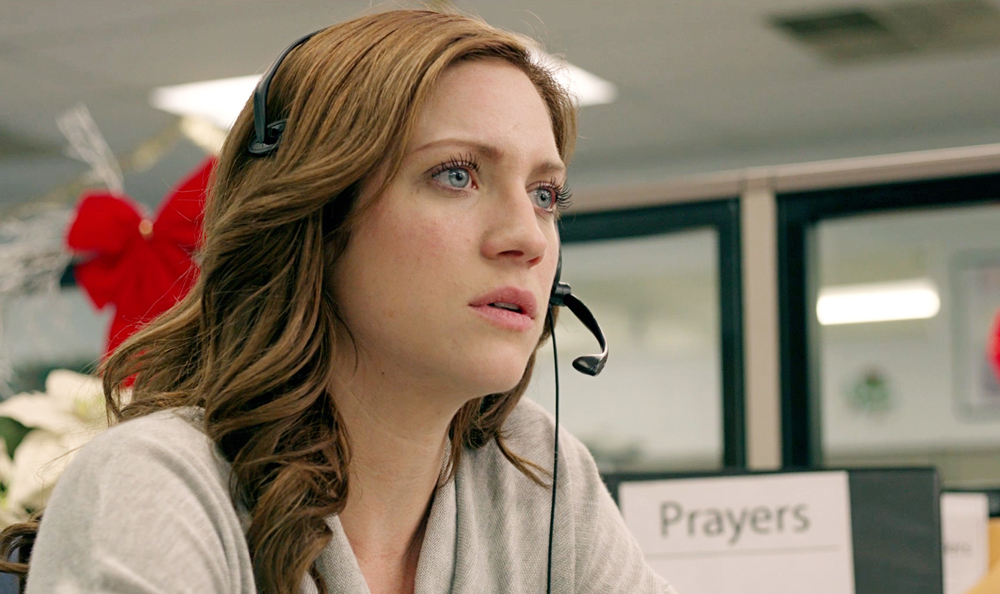When Maggie Kiley was trying to get the right tone for a scene between Brittany Snow and Tom Lipinski, the stars of her latest film “Dial-A-Prayer” who share a tender moment over the phone despite never meeting each other in person beforehand, she told the story of how she first met her husband Matthew Puckett. Now a partner in both life and film – he composes the scores for her films – Puckett once was applying for a job to support his music career when he first got a hold of Kiley, then the manager of a New York steakhouse while supporting her own artistic ambitions, on the other end of the line.
“My [future] husband called this restaurant where I was working and there was this instant recognition to his voice,” said Kiley, who quickly found a connection with this stranger. “I’ll just never forget that moment. It was almost like the future was saying, ‘Pay attention! This is someone.’”
Not surprisingly, the moments in “Dial-a-Prayer” when Snow’s character Cora actually gets out of her own head long enough to listen to what Lipinski’s Chase is saying are now some of Kiley’s favorites in the film, a drama about a young woman forced to pay back a Prayer Call Center which she helped deface in a fit of anger by serving as one of its respondents. Thrust into a situation where she’s often more fragile than the people calling in, she gradually finds strength not necessarily in the religious advice she doles out at the behest of the call center’s leader (William H. Macy, his hair perfectly coiffed upturned towards the heavens) but in the gradual discovery of a purpose in life and the ability to let go of a tragic past. Her confidence is bolstered by the unexpected visit of Chase, who is compelled to meet Cora in person after a particularly intimate exchange.
As in her first film “Brightest Star,” in which she peeked in on the misadventures of an aimless post-grad looking for direction, Kiley has created an intriguing parallel of that scenario in “Dial-A-Prayer,” to some degree, in focusing on a character desperately in search of something greater than themselves as an organizing principle for the universe. But whereas “Brightest Star” presented a world full of opportunity to its lead to the point where it was overwhelming at times, “Dial-A-Prayer” finds someone in Cora who has purposefully closed herself off from others, worried that opportunity can only mean more heartbreak. Kiley comes by these character studies earnestly, one of her most distinctive and endearing qualities as a filmmaker being the sincerity with which she explores the often flawed people at the center of her stories. Another is her generosity with actors, whose meaty parts are surely a byproduct of Kiley’s origins as an actress who studied at Macy and David Mamet’s Atlantic Theater Company in New York.
Shortly before “Dial-A-Prayer” hits theaters and just a year after we spoke about her last film, the prolific director (and Moveable Fest favorite) was kind enough to hop on the phone, fittingly, to discuss the inspiration behind her latest film, collaborating with her actors to shape their characters and with a third movie on the way (“Caught”), how she stays so busy.
Many years ago, before I even started writing movies, I heard an advertisement on the radio for a prayer hotline. I was so fascinated with that idea that people would utilize that format for praying, it planted this seed with me. I started thinking about what it would be to answer the phone at a place like that — in a phone sex world, there’s this certain disconnect between what you’re delivering, but to take something that’s so personal and potentially so spiritual [as religion] and be farming it out over the phone seemed really like a fascinating place to start writing from. I started thinking, what happens if you’re there and you actually don’t want to be there. I pretty much made it up from there.
Thinking back to “Brightest Star,” you told the story about a guy whose life was full of possibility, and in this, it seemed like the opposite since your main character is paralyzed emotionally by what’s happened to her even though she’s quite young. Did you actually ever see this as a response to the film you made before?
I certainly can see it now, but when I was writing it, I thought, “Oh, wow! This is so great. Here’s a similar story in that it has this central protagonist, but this time it’s a woman.” Because I come from acting, when I write, at least in these two movies, I make it so that central person is literally in every scene, so you’re navigating through it with them and [it was only] when I started to come to the end of writing it, I realized that I was essentially in another coming-of-age, twentysomething journey. I hope “Brightest Star” was like this too, but I think “Dial-A-Prayer” is a little more universal in its storytelling because it deals with some deeper issues along the way.

Definitely. Not just in your twenties, but throughout our lives, I think a lot of times we’re looking for something outside of ourselves to define who we are. With this story in particular, while Cora has really shut down to what’s outside of her, when she does actually start putting her faith or her beliefs in something or someone else, and then potentially back in herself, that that’s when she starts really moving forward in her life.
Brittany Snow is a really interesting choice for this, given you don’t usually see her roles that are this dramatic. How did she become the lead?
I was looking at a lot of different people. Brittany was definitely not someone I envisioned because I had a very different idea of her from “Pitch Perfect,” “Hairspray” and “American Dreams,” but fortunately, I was able to meet with her. She really blew me away in how she connected to this script and her insights into the character of Cora were really, really extraordinary. I’m really picky about actors. I like people to be super-smart and thoughtful in how they speak about things and she was that a million times over. She even agreed to come in and workshop through some of the scenes in the film to test the waters for me and her to see how it was to work together. She started off and right away, I thought, “Wow! I’ve found Cora.” She really brought everything [the role] needed and I’m so happy for her because I think this really shows her strengths as an actress and the scope of her range, which is really quite extraordinary.
Coming from an acting background yourself, how much room to do like to give your actors find the character and define the part versus what ownership you have over it as a writer/director?
Really, what I’ve learned is you have to ride this line where you have to be really clear in your own vision and expectations. Then you have to be completely flexible and open to what shows up on the day. The more rigidity you have, the less organic the experience is for everybody on set. On movies like this, you don’t have a lot of rehearsal or prep, but we certainly had a lot of discussions. With Brittany, it was a great collaboration of what I wanted and what she wanted and really letting it go from there and that was the same with everybody on this film.

That’s all him! He gets full credit for that and the self-tanner, which I don’t know how clear it is that he’s wearing. But this was the first screenplay I ever wrote on my own and for me to write dialogue and craft the story, it really helps to write for actors that I know because I can picture them in my head and figure it out as I go. Bill was so clear in my head. You never know when you write for your friends if, in the end, they’ll respond to it, or later, if their schedules and their agents allow them to come and work with you. I was very nervous when I sent the script to him. But he responded so positively. He wrote me a really beautiful e-mail about his own belief system and how this movie and the story really resonated for him in this bigger way. Fortunately, he was able to come down to Michigan and shoot it. It was a real thrill for me to get to collaborate with him in that way because he’s been such a mentor of mine and someone I obviously admire and look up to quite a bit.
Shooting in Michigan looked cold. Was there a particularly crazy day of filming?
It was cold. You know the scene where Cora has the accident? That day was probably the coldest day ever in Michigan and we had this huge, complicated sequence with a crane, a stunt person, a car, and we shut down the street. It was a blizzard of snow, but you’d turn around and move the camera and then the sun would come out. It was just one of those tricky days where every time we moved, it felt like a different day. But nothing awful happened on this film. I felt very guided through it, in a positive way.

Definitely. On “Brightest Star,” I had my infant son on set, so this one was a lot easier. You learn so much from these experiences, I’ve certainly grown in my confidence. I think writing the script on my own, being in Michigan, not in Los Angeles and creating this world from the ground up and having everybody there on location [helped me] to keep growing and getting better as you go. There are things that I learned on this movie that I applied on my next movie.
It was just a year ago “Brightest Star” came out and your next film “Caught” is already in the can. How is it you’re moving at such a rapid clip?
I have a great producer who made “Brightest Star” and also got this movie financed and I also think I have good relationships with actors. That’s something I’m really proud of. Brittany had a great experience on this movie and her friend Anna Camp, from “Pitch Perfect,” came on to do the next movie that I’m finishing up, so I think it really helps in getting your films made when there are actors who want to show up and work with you. I also think “Dial-A-Prayer” was a really unique script. There aren’t a lot of movies out there like this, so maybe that was what helped get it made. But I am very conscious of how amazing it is to get two movies financed and sold and then get hired to do another one [so quickly]. I want to keep going.
“Dial-A-Prayer” opens on April 10th in Los Angeles at the Music Hall, Dallas at the Texas Theatre, Atlanta at the Plaza Atlanta and the AMC Gulf Pointe in Houston, among others. It will also be available on iTunes.






Comments 1